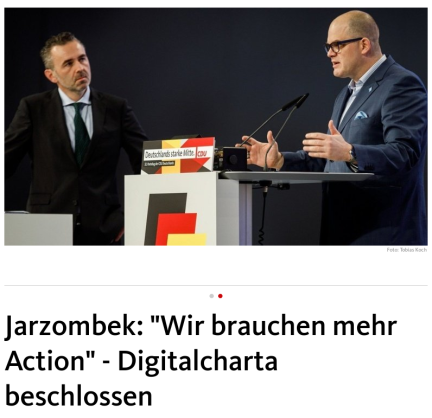
The principles of open source should apply to public procurement, says the CDU, Germany’s ruling Christian Democratic Union. All future digital projects should be published in an open repository, the party writes in its “Digitalcharta Innovationsplatform D”. This policy document was adopted at the CDU’s annual convention, which took place in Leipzig on Friday and Saturday.
“Only openness creates competition, only through openness can new players in the competition challenge the top dogs,” the CDU writes in its digital charter, adding: “Publicly funded software should serve all citizens. In addition, free and open APIs should facilitate access for independent development.”
Germany has ignored the importance of software, the party writes in an article on its website. It quotes Thomas Jarzombek, commissioner for the digital economy at the Federal Ministry of Economics: “Open Source is an opportunity for Germany and for Europe to catch up with the Americans and the Chinese.”
Digital sovereignty
At the convention, the CDU resolved to make digital sovereignty a core of Europe’s digital approach. The party wants the state to have the courage to share all documents on IT projects, use general standards, and offer open interfaces. “We rely on this new paradigm, entitled Open-X,” the CDU writes in its Digital Charter. “It will be the leitmotif: open interfaces and interoperability in software, hardware, procurement, data, and in knowledge and information.”
Germany’s ruling party also agreed that Germany should appoint a minister to focus on all things digital and, according to IT news site Heise, strengthen the digital commission at the Bundestag, the country’s federal parliament.
The adoption of the Digital Charter was welcomed by the FSFE, a free software advocacy group, and by the Pirate Party in Hesse, one of the country’s sixteen states.
“We expect the CDU to work with the government and state parliaments to create the legal basis for publicly funded software to be released under a free- and open source software license,” Sander Alexander, the FSFE’s EU public policy programme manager, told the European Commission’s open source observatory. He hopes it will also influence initiatives in the EU, with the CDU being part of the EPP, the largest political group in the European Parliament.
More information:
CDU digital charter (PDF, in German)
CDU anouncement (in German)
Heise news item (in German)
Golem news item
T3n news item (in German)
FSFE press statement
Pirates Hessen statement (in German)

